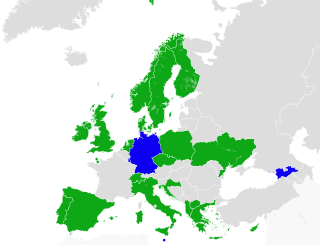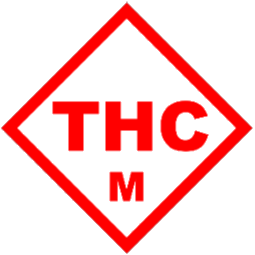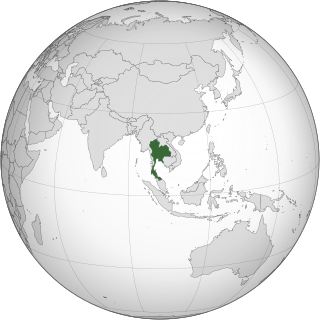
The legality of cannabis for medical and recreational use varies by country, in terms of its possession, distribution, and cultivation, and how it can be consumed and what medical conditions it can be used for. These policies in most countries are regulated by three United Nations treaties: the 1961 Single Convention on Narcotic Drugs, the 1971 Convention on Psychotropic Substances, and the 1988 Convention Against Illicit Traffic in Narcotic Drugs and Psychotropic Substances. Cannabis was reclassified in 2020 to a Schedule I-only drug under the Single Convention treaty, with the schedules from strictest to least being IV, I, II, and III. As a Schedule I drug under the treaty, countries can allow the medical use of cannabis but it is considered to be an addictive drug with a serious risk of abuse.
A drug policy is the policy regarding the control and regulation of psychoactive substances, particularly those that are addictive or cause physical and mental dependence. While drug policies are generally implemented by governments, entities at all levels may have specific policies related to drugs.

Cannabis in Switzerland is illegal, though minor possession was decriminalised to a fine in 2012. Several cantons began to allow adults to cultivate and use cannabis in 2012, but this was struck down by federal courts. In 2016, four cities stated they were looking into establishing pilot cannabis clubs. The number of cannabis users in Switzerland is estimated to be around 500,000 among a population of 8 million.

Cannabis is a plant used in Australia for recreational, medicinal and industrial purposes. In 2022–23, 41% of Australians over the age of fourteen years had used cannabis in their lifetime and 11.5% had used cannabis in the last 12 months.

Cannabis political parties are generally single-issue parties that exist to oppose the laws against cannabis.
The drug policy of Germany is considered to be one of the most lenient among European Union (EU) countries. Policies vary depending on the state.

In the United States, cannabis is legal in 39 of 50 states for medical use and 24 states for recreational use. At the federal level, cannabis is classified as a Schedule I drug under the Controlled Substances Act, determined to have a high potential for abuse and no accepted medical use, prohibiting its use for any purpose. Despite this prohibition, federal law is generally not enforced against the possession, cultivation, or intrastate distribution of cannabis in states where such activity has been legalized. Beginning in 2024, the Drug Enforcement Administration has initiated a review to potentially move cannabis to the less-restrictive Schedule III.

Cannabis in Wisconsin is illegal for recreational use. Possession of any amount is punishable by up to 6 months in prison and a $1000 fine for a first offense. A second offense is punished as a felony with up to 3.5 years in prison and up to a $10,000 fine. At the local level, however, numerous municipalities and counties have decriminalized cannabis or lessened penalties for minor possession offenses. Medical use is legal only in the form of low-THC cannabis oil.

Cannabis in Iowa is illegal for recreational use if classified as marijuana but consumable hemp products including CBD products are legal for consumers to possess and registered retailers to sell. Possession of even small amounts of marijuana is a misdemeanor crime. The state has a medical program for patients with qualifying debilitating medical conditions that allows for the legal sale and possession of no more than 4.5g of THC per patient every 90-day period. Allowed modes of consumption are oral and topical forms including, but not limited to; tablets and tinctures, nebulizable inhalable forms, suppositories, and vaporization.

Cannabis in Missouri is legal for recreational use. A ballot initiative to legalize recreational use, Amendment 3, passed by a 53–47 margin on November 8, 2022. Possession for adults 21 and over became legal on December 8, 2022, with the first licensed sales occurring on February 3, 2023.

Cannabis in New York has been legal for medical purposes under New York law since 2016, and recreational purposes since 2021. As of 2022, recreational cannabis is for sale legally in the state, only through state-approved dispensaries.

Cannabis has been cultivated in Japan since the Jōmon period of Japanese prehistory approximately six to ten thousand years ago. As one of the earliest cultivated plants in Japan, cannabis hemp was an important source of plant fiber used to produce clothing, cordage, and items for Shinto rituals, among numerous other uses. Hemp remained ubiquitous for its fabric and as a foodstuff for much of Japanese history, before cotton emerged as the country's primary fiber crop amid industrialization during the Meiji period. Following the conclusion of the Second World War and subsequent occupation of Japan, a prohibition on cannabis possession and production was enacted with the passing of the Cannabis Control Law.

Cannabis in Malta is decriminalised, within limits, to grow, use, and possess for adults. In 2018, the Parliament of Malta legalised medical cannabis. On 14 December 2021, the Parliament of Malta decriminalised recreational cannabis for personal possession and use for those aged 18-years-old and over, becoming the first EU country to do so.

Cannabis in Mexico is legal for both recreational and medicinal purposes. It became legal for recreational purposes in June 2021, upon application and issuance of a permit from the health secretariat, COFEPRIS. On 29 June 2021, the Supreme Court of Mexico decriminalized the recreational use of cannabis. President Andrés Manuel López Obrador signed a bill that allows adults 18 and over to possess up to 28 grams of cannabis and grow up to six marijuana plants on their property.

In Thailand, cannabis, known by the name Ganja has recently had new laws passed through. Cannabis that has less than 0.2% THC, referred to as industrial hemp in the USA, was legalised on 9 June 2022. Medicinal cannabis, with no THC restrictions, was made legal in 2018 but required patients to obtain a prescription from a medical practitioner. Recreational cannabis is still illegal according to Thai law.
The list includes and details significant events that occurred in the global history of national-level implementations of, or changes made to, laws surrounding the use, sale, or production of the psychoactive drug cannabis.

Cannabis in Ukraine is legal for medical, industrial purposes, and scientific and scientific-technical activities.
The German cannabis control bill is a bill passed by the German Bundestag in February 2024, and the Bundesrat in March, that legalised the adult use of cannabis in Germany, as well as the personal possession and cultivation of limited amounts of cannabis by adults in Germany, beginning on 1 April 2024. Adults in Germany are allowed to possess up to 25 grams of cannabis in public and up to 50 grams of dried cannabis at home. Each individual adult in Germany may also have up to three of their own cannabis plants at home. As part of the bill, adult-only non-profit cannabis social clubs with a maximum of 500 members became legal in Germany on 1 July 2024.
The cannabis industry is composed of legal cultivators and producers, consumers, independent industrial standards bodies, ancillary products and services, regulators and researchers concerning cannabis and its industrial derivative, hemp. The cannabis industry has been inhibited by regulatory restrictions for most of recent history, but the legal market has emerged rapidly as more governments legalize medical and adult use. Uruguay became the first country to legalize recreational marijuana through legislation in December, 2013. Canada became the first country to legalize private sales of recreational marijuana with Bill C-45 in 2018.

On October 17, 2018, cannabis was legalized in Canada for recreational and medical purposes. It was already legal for medicinal purposes, under conditions outlined in the Marihuana for Medical Purposes Regulations issued by Health Canada, and for seed, grain, and fibre production under licence by Health Canada.

















